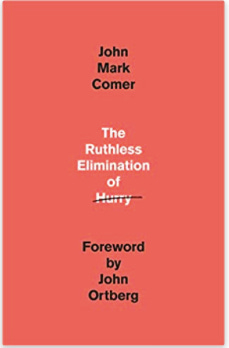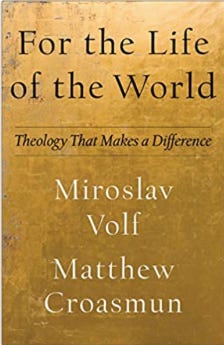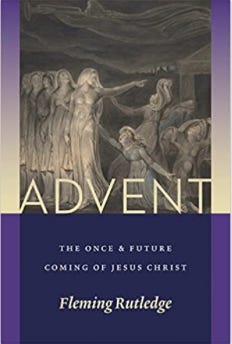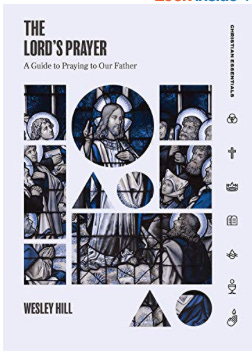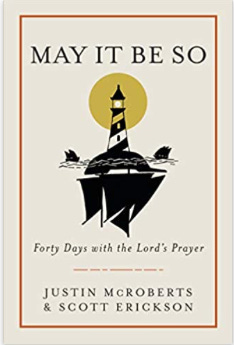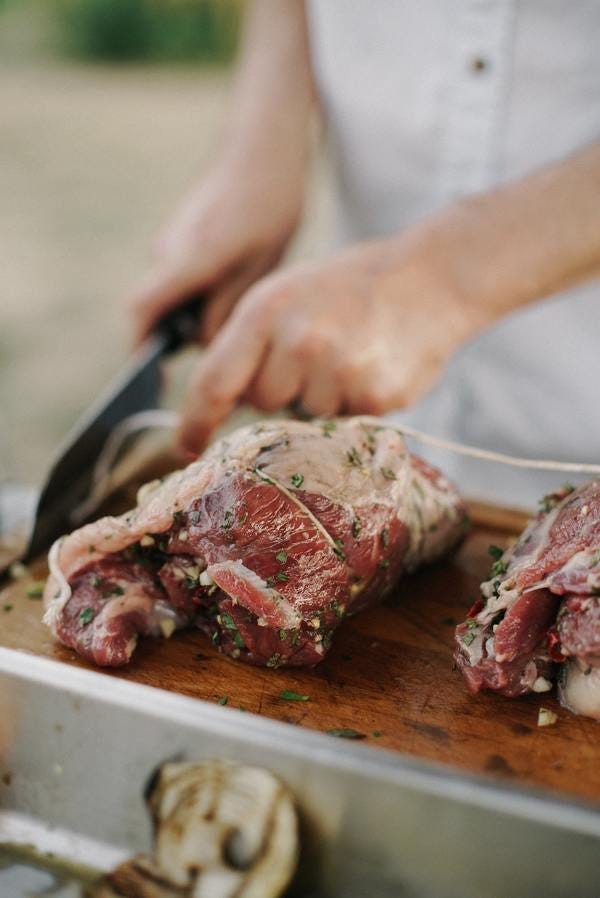The Lectio Letter - Issue #23 - All the books I read in 2020 reviewed
Books… are like lobster shells, we surround ourselves with ‘em,then we grow out of 'em and leave 'em behind,as evidence of our earlier stages of development.”
- Dorothy Sayers
Welcome to the First Edition of the Lectio Letter in 2021, this is going out to all 43 subscribers rather than the regular merry band of 17 paying members. The Lectio Letter helps fund my book-buying habit and in return, you get 2 articles a month, plus some personal updates, music, movie, and recipe recommendations. Sign up here.
Despite intending this newsletter to be about books, it has not really lived up to that hype. I suspect for most of you reading this, that is not a particular disappointment, but I thought for the sake of the few of you that were still hoping for book summaries/reviews this issue might scratch that itch.
I imagine I read at least as much as I ever have this year. Despite having the extra time with lockdown, Rachel and I, along with a team helped build curriculum and assign books for the Teleios programme as well as contribute to a reworking of the first module of the M.A. degree that we help staff.
I thumbed through countless books, read chapters, journal articles, web articles, to assess how useful they would be for sections of these programmes but below I’ve only included books I read the 'old fashioned way’, front to back…
One big help this year has been using the (amazon owned) service, Good Reads. It’s like the nerdiest social network you’ve ever come across but it solved a problem for me. I have the (slightly self-indulgent) habit of starting a multitude of books by reading the introduction and first chapter. Then I’ll leave the book open face down on the nearest surface. Within 48 hours, these books get ‘tidied’ away, sometimes closed by my wife, to who’s credit it is that our house doesn’t resemble a used book store that was the scene of a gang fight. This situation leads me to continually and inadvertently 'abandon’ books just because they no longer show up on my radar. Goodreads solves this handily by not only allowing me to log all the books I own but also which ones I am reading and even the last recorded page number (I have to do that manually but it’s motivating to see when I only have 20% of a book left).
Goodreads has also helped me keep track of books. Owning, ahem, quite a few, Goodreads now allows me to tell you that number is 513 thanks to the mammoth lockdown mission of logging them (pictured below). I tend to lend out a book or two now and again and Goodreads allows me to temporarily tag it as ’lent-out’. Very handy indeed.
I have decided, thanks to the generosity of the dear readers of this Lectio letter, then I need to further intensify my reading this year to justify the book purchases that have been able to come thick and fast! That being said, there are, as a dear friend and mentor once remarked, many ways to read a book.
Maybe that’s an article for another time. So my goal this year is going to be to read 52 books. I probably won’t keep the pace of 1 a week (some are shorter, some are longer), but I will probably make a bit more of an intentional reading plan, especially considering I have to put together a reading list for our “Intro to Theology” module in the next couple of months. Watch this space.
Status Board
So here goes, the books of 2020, these are not books published in 2020, just the one’s I’ve read in 2020.
The Top 3 Books of 2020
1. The Ruthless Elimination of Hurry: How to Stay Emotionally Healthy and Spiritually Alive in the Chaos of the Modern World by John Mark Comer
This is my book of the year almost entirely because it ended up being the book I most recommended throughout 2020.
Don’t be put off that Comer, unsurprisingly, has written for a North America Gen Z Audience, Comer does a fantastic job of cultural analysis while standing on the shoulders of Dallas Willard and other sources of Christian wisdom and recommends important measures required to resist the destructive pace of the modern world.
Comer’s strength is that he takes the wisdom of others and applies his considerable gift in communication, as can be seen in the numerous ‘quotable’ phrases he builds.
“An easy life isn’t an option; an easy yoke is.”
“Attention is the beginning of devotion.”
love, joy, and peace are at the heart of all Jesus is trying to grow in the soil of your life. And all three are incompatible with hurry.
“Hurry is violence on the soul.”
the modern world is a virtual conspiracy against the interior life.
You won’t be sorry for reading or recommending this book.
2. Sacred Fire: A Vision for a Deeper Human and Christian Maturity by Ronald Rolheiser
“Success has little to teach us during the second half of life. It continues to feel good, but now it is often more an obstacle to maturity than a positive stimulus toward it.”
Ronald Rolheiser is a catholic priest and writer on the Spiritual Life. This book was recommended as important for those in the middle part of life, the years between 30 and 60. Rolheiser describes life’s three phases and their tasks. The first, to ‘build a life’, which is mostly addressed in his earlier book Holy Longing, the second is to 'give that life away’. This second task is far less intuitive for those of us in the modern world with its focuses on success rather than fruitfulness. I read this book incredibly slowly, taking long breaks to try and stew on its insights and directions.
Whereas Comer’s book is fantastic because of how easy it is to connect with his insights, Rolheiesers book is insightful particularly because it is not from the evangelical tradition. Because it shares truths on the inner life with God in a different key. For those who are well versed in disciple-making, this is a breath of fresh air helping us consider what it might take to find deeper maturity in the middle part of life by listening to a voice outside the evangelical tribe.
3. You Are What You Love: The Spiritual Power of Habit by James K. A. Smith
“Discipleship, we might say, is a way to curate your heart, to be attentive to and intentional about what you love.”
“Your love or desire—aimed at a vision of the good life that shapes how you see the world while also moving and motivating you—is operative on a largely nonconscious level. Your love is a kind of automaticity. That’s why we need to be aware of how it is acquired.”
I first read this book in 2018 after reading the first two parts of Smith’s Christian liturgies series. Smith, in this book, finally delivers on his promise for a popular unpacking of his work on Augustine and Charles Taylor, while not requiring his readers to even know those names or the figures behind them.
Smith persuasively argues that we become what we worship, but that we might not worship what we think. Our hearts have been diverted from what we might say we ‘believe’ by alternative stories offered to us by our surrounding culture. For anyone interested in human change, discipleship, and church leadership these insights are foundationally important.
All the books I read in 2020 reviewed
Futureville: Discover Your Purpose for Today by Reimagining Tomorrow by Skye Jethani
We read Jethani’s brilliant book as a part of the Teleios programmethis year. It’s like a brilliant lay level combination of Crouch’s Culture making and NT Wright’s Surprised by Hope. If you want to introduce why what you believe about eternity impacts how you build God’s Kingdom in the here and now this is a good start.
All Things New: Joining God’s Story of Re-Creation by Pete Hughes
Pete Hughes does an impressive array of things in this book; He gives an overview of the biblical narrative, shares the ups and downs of planting a city-centre church and defends annihilationism! He is writing to help deepen appreciation of the theological nuance of the biblical story for those in the pew but uses piercing vulnerability and honesty sharing his own story which enlivens the whole undertaking.
Inexpressible: Hesed and the Mystery of God’s Lovingkindness by Michael Card
I read this alongside the formation track of our M.A. in Christian Formation and it had been seriously hyped by the staff who recommended it. I found it an enjoyable if not slightly repetitive word study on the Hebrew word Hesed, which, as the title suggests is difficult to translate and yet roughly means loving-kindness. While it may have simply been overhyped for me, several students said it seismically shifted their view of God, so maybe I was just in the wrong place at the wrong time.
Keeping the Sabbath Wholly: Ceasing, Resting, Embracing, Feasting by Marva Dawn
One of the primary take-aways from Comer’s book was the recovery of Sabbath. I decided that every sabbath I would read a little of a sabbath book. This book by Marva Dawn is excellent, not only for its interplay between her own life and historical practice of the sabbath but because as a single academic female she narrates her winsome ability to navigate the challenges of celebrating sabbath when you don’t have the picket fence and 2.5 children setup.
The Common Rule: Habits of Purpose for an Age of Distraction Justin Whitmeal Earley
This book was an excellent companion or even workbook to both Comer’s book (The Ruthless Elimination of Hurry) and Smith’s (You are what you love). While both of those books do excellent work at gesturing towards a change in ‘doing’, Earley’s book is more like a workbook taking you along each step. The refreshing thing about it though is that it is flowing from the life of a self-confessed driven ex-missionary turned lawyer workaholic, so there is plenty of focus on subtraction not just addition to the daily rhythms. This would be a great book to start the year with.
Pursuing God’s Will Together: A Discernment Practice for Leadership Groups by Ruth Haley Barton
Decision making is hard. It’s even harder when you have to do it with other people. Our focus on individualism and freedom cuts off the very virtues that allow us to make honest and open decisions in a group. In this book Barton, while employing the slightly tired analogy of a boomer generation church group (which in her defence is likely her audience), unpacks a number of practical tools, including what was for me, as a fairly willful personality, the most insightful, a prayer process for indifference.
The Gift of Being Yourself: The Sacred Call to Self-Discovery by David Benner
This short book packs an incredible punch. Benner locates the heart desire of humans, identity creation via life in and for the world and narrates how to get it and how to miss it. He weaves the necessary reality of self-awareness without self-obsession into naming our vocation, a difficult task that he more than suceeds in.
Evangelicals on the Canterbury Trail: Why Evangelicals Are Attracted to the Liturgical Church by Robert Webber
So many people have written on the ‘road to Rome/canterbury’ and give or take, it seems like this was the book that started it. Webber is the original proponent for a liturgical turn within evangelicalism. Many of the more recent proponents are standing on his shoulders. A worthwhile read while more recent writers in this stream have the benefit of narrating how this trend has unfolded which is the inevitable weakness of a book that started it all!
Dwell: Life with God for the World by Barry Jones
If I had read this book for the first time this year it would likely have been my #1 book of the year, but re-reading it again convinces me that what Barry Jones does in tieing together spiritual formation and missional theology is tapping into the central need in evangelicalism today. Maybe it is a little more honest to say that Jones’ contribution overlaps with my sense of vocation and therefore resounds particularly powerfully.
For the Life of the World: Theology That Makes a Difference by Miroslav Volf and Matthew Croasmun
Volf is an important theologian who is trying to convince both Christians and those outside the church that the Christian story and faith have a significant contribution to an understanding of human flourishing. This book, although a little dense for a non-theologian, does a convincing job articulating the importance of theology not getting stuck in the ivory tower. The Christian community over the centuries has something say about how humans thrive.
Theology and Spirituality by Andrew Louth
This short volume, a pamphlet more than a book really, is by an eastern orthodox theologian who argues for the crucial re-integration of the devotional life and the work of theology. Once again, due to its overlap with some of my own sense of calling, there was very little to disagree with!
Virtue Reborn/After you believe: Why Christian Character Matters by NT Wright
In this book, NT Wright does a fantastic job of summarising the process of Christian growth. He does it in conversation with the Greek Aristotelian tradition and explains how Paul picks up these learnings and transfigures them in the Gospel.
The Eternal Current: How a Practice-Based Faith Can Save Us from Drowning by Aaron Niequist
I had hoped in this to find an entry-level book for the programmes we run that explain the significance of practice for Christian growth. Having read lots of the books that Niequist is quoting there was little that felt engaging in it or that hasn’t been said more compellingly somewhere else. Niequist, who has been a part of the US megachurch scene and then walked the road to canterbury (see Webber’s book above), is understandably writing from this North American post-evangelical viewpoint and trying to capture those who might feel like they are losing their faith. This might be just the right book for the right person, but unfortunately, I was not it.
The Meaning of Marriage: Facing the Complexities of Commitment with the Wisdom of God by Timothy and Kathy Keller
A classic book on marriage, written back and forth between Tim Keller and his wife, it deserves to be read every couple of years to remember the ever-present dangers and invitations to the depth that can exist in the covenant and sacrament of marriage.
No Neutral Ground: Finding Jesus in a Cape Town Ghetto by Pete Portal
This was the last book I read in 2020 and it was hard to put down. Once again, I have good personal reason to have found it so captivating. Firstly, we have several common friends with Pete while only meeting him for the first time at the end of the year. We are both from similar church streams in the UK, lived in South Africa for ten years and have navigated the complexity, pain, frustration and joy that comes from ministering in a township context. Pete’s book is an important introduction to the realities of South Africa as well as being one of the only writers I’ve seen advocating for a truly blended charismatic and social justice approach. Proving once again that living out the ways of Jesus in broken places simply doesn’t allow you to pick sides when it comes to the promise and fulfilment of God’s Kingdom come.
Advent: The Once and Future Coming of Jesus Christ by Fleming Rutledge
Female Episcopalian Preacher / Theologian Fleming Rutledge who a few years ago produced the book on the crucifixion compiled this compendium of articles and sermons on Advent. Readers of the last few reflections I’ve made on Advent won’t be surprised that this book fuelled many of my reflections on the discipline of ‘waiting in the dark’ before the light of Christ comes in Christmas.
Open Mind, Open Heart: The Contemplative Dimension of the Gospel by Thomas Keating
A classic book given to me by a Spiritual Director is the foundational text for a practice named Centering Prayer. Keating a Trappist monk who died in 2018, develop or re-pioneered a form of prayer in response to the many Catholics who were leaving the church for eastern forms of religion. What Keating does is to show that reflective mindfulness in the presence of God is a foundational Christian practice for those who want to appreciate the benefit of knowing Christ’s presence at all times. While the book is written half to seekers and half to contemplative Catholics, there are a few eyebrow-raising moments for the evangelical reader, but I am convinced that we need guides into the place of deep prayer and this was a resource to that end for me this year.
The Lord’s Prayer: A Guide to Praying to Our Father by Wesley Hill
The Lexham Christian Essential series is fantastic. I’ve bought all three and so should you. While it is hard to compete with the incredible quality of Ben Myer’s volume on the Apostles creed, Wesley Hill comes very close. Unpacking the prayer line by line Hill recovers the genius and foundational catechistic quality of the prayer for followers of Jesus.
May It Be So: Forty Days with the Lord’s Prayer by Justin McRoberts and Scott Erickson
I used this as a devotional book for a period this year. It is a very enjoyable light read alongside some wonderful illustrations by Scott Erickson (famously on Instagram). The book is essentially a series of illustrations with one-liner prayers interspersed by blog-length reflections on sections of the Lord’s Prayer. The only thing that lets the book down is its very “self-published” feel, the layout and lack of page numbers make you feel like it was put together by someone in MS Paint.
- Prince Caspian (Chronicles of Narnia, #2)
- The Voyage of the Dawn Treader (Chronicles of Narnia, #3)
- The Silver Chair (Chronicles of Narnia, #4)
- The Horse and His Boy (Chronicles of Narnia, #5)
- The Last Battle (Chronicles of Narnia, #7)
At the end of 2019 and the beginning of 2020 I read and listened through all the Narnia series. I had thought I had done it before, but I had no recollection of the Sliver chair and the Horse and His Boy as I read them. Narnia is a classic for a reason, Lewis unpacks the dynamics of the Gospel through these books in ways that renew the mind through the back door of narrative. Somehow reading the scriptures alone would not bring you easily to the place that Lewis manages to. Its a testimony to the power of analogy.
Home, Lila and Jack (3 novels in the same series) by Marilynne Robinson
When I heard that the final book in the Gilead series was coming out this year I hurriedly found the other books and brushed up on the story. The first book in the series, named Gilead, won the Pulitzer Prize for fiction and is likely my favourite novel of all time. The series centres around the town of Gilead, a tiny town with two churches whose pastors have built an enduring friendship. When people say that the power in dialogue is what they don’t say, they are talking about writing like Robinson. Her writing is so immersive that you want to work slowly yet you are led compulsively through the narrative. Her characters have an extraordinary level of dimensionality to them, like real people. To achieve this level of mastery is mind-blowing to me. Many people will find these books slow-paced, but for those who can appreciate them there are “kingfisher catching fire”.
Barbarian Days: A Surfing Life
Now into the extremely niche, this, from a self-indulgent perspective was one of the most enjoyable reads of early 2020. William Finnegan’s autobiography of surfing is an immersive and spellbinding book which explains surfing and somehow the nature of human desire and compulsion at the same time. He won a Pulitzer for a book about surfing, that says something.
After The Party by Andrew Feinstein
One of my goals in the coming year is to read a bit more broadly. While the bread and butter of my reading will continue to be in the area of theology and discipleship our lives are rooted in the South African soil for now and so I’ve felt it important to keep connecting with the post-1994 story here. There are so many honestly, lazy opinions around the complexity of South Africa politically and culturally. I am hoping to develop a nuanced and grounded perspective by reading the books that are receiving acclaim on the subject. After the Party charts the hopeful emergence of the ANC post Mandela’s presidency and covers Feinstein’s involvement in unearthing corruption in trade and arms deals. One thing is for sure, while politicians are culpable, international elements were circling South Africa like vultures from the beginning. Depressing but clarifying reading.
Missionaries by Phil Klay
This was a fantastically well written yet seriously gritty novel about three lives that intersect amid a Columbian kidnapping situation. Klay writes a chapter charting the life journey of each character and then brings them together masterfully. While it was an impressive book, it charts some dark material around war, drug cartels and human rights, not light stuff.
A Short Status Update
Work: Precious little! But I did begin Hearers and Doers by Kevin Vanhoozer which may make an appearance in this years curriculum. I’ll also work on some recorded teachings on the Story of God and Trinity for the latest Centre programme “Renew”.
Food and Drink:
As promised in the last last Lectio, here’s our pick for the best Christmas lamb recipe, courtesy of Cape Town’s Karen Dudley of “the Kitchen” fame, which sadly closed during the lockdown.
I teased, yet, as one shrewd reader of the newsletter noticed, did not deliver on the “best” lamb recipe that has been our go-to for the last few Christmas’, well here it is.
Take about 2.5kg Deboned Leg of lamb and marinate it with 3 sprigs Rosemary, 4 cloves garlic, the zest of 2 lemons and the juice of 3 and 1 and ¼ cups of Olive oil in the refrigerator for 30 hours or more. Take the lamb out before cooking and allow it to come to room temperature. Pre-heat the oven to 200c and either heat up you largest pain on the stove or better yet get your bbq/braai blue smoke hot. Season the leg with lamb seasoning and vegetable oil and then sear the leg fat down to seal the leg. Then place the leg fat side up in the oven for about 40 mins. Allow the leg to rest for 10+ mins after it emerges and then carve it as thinly as you can. Arrange the slices on a platter, toast pine nuts and pour over chermoula.
To make the chermoula
Take 30g of Coriander, 30g of parsley, 2 cloves of garlic, 2 tbsp lemon juice, 1 tsp cumin, ¼ tsp of paprika, chilli flakes, cinnamon, salt and a ¼ cup of olive oil and pulse it together in a food processor until it forms a paste.
Music: Unsurprsingly the neo-soul continues into 2021..enjoy!
Durand Jones & The Indications - Smile (Live on KEXP)
Ben L'Oncle Soul - Two Trees
Decided that my lengthy review section in addition to a miscellaneous link list would turn this into an insanely long email.. so for now I will say goodbye..
See you later this month….





